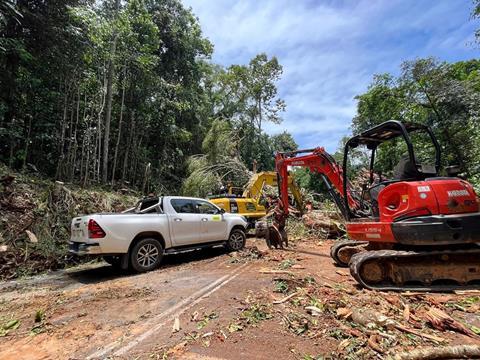Industry body prompts government to financial assistance to citrus growers as transport costs rise following ex-Tropical Cyclone Jasper

Citrus Australia has called on the Queensland government to provide further financial assistance to citrus growers in the state’s far north, as transport costs escalate in the wake of ex-Tropical Cyclone Jasper.
The extreme weather event caused substantial damage to citrus orchards across Far North Queensland, particularly in areas surrounding Mareeba and Dimbulah.
Subsequent flooding has also caused widespread damage to the region’s road network, including the Palmerston Highway, a key transport link for growers based in the Atherton Tablelands. This has resulted in major transport disruptions, hindering the delivery of fresh fruit to market.
Citrus Australia said it has been made aware that some transport companies have started applying a ‘Palmerston Highway Diversion Charge’ of A$30 per pallet. This diversion charge is also being coupled with a fuel levy in some cases.
Citrus Australia chief executive Nathan Hancock said it was unreasonable to ask growers to cover these added expenses.
“These extra charges are adding up quickly, with one grower producing evidence that shows their bill for the diversion charge alone was A$2,605 in one week,” Hancock explained.
“This is against the backdrop of rising production and input costs, not to mention the time and money that many growers are investing in restoring their orchards following the deluge caused by the cyclone.
“I’ve written to Mark Furner, Queensland minister for agricultural industry development and fisheries, and minister for rural communities, asking that he and his government consider providing financial assistance or grants to affected citrus growers to offset these extra transport costs, caused by damage of road infrastructure due to flooding.”
Hancock’s letter to minister Furner outlined the need for immediate transport infrastructure repair, urging the government to allocate additional resources to the restoration of roads connecting citrus orchards to markets.
Hancock also called for a full-scale review of road infrastructure between Cairns, Mareeba and Dimbulah.
“Ex-Tropical Cyclone Jasper has emphasised a major issue in relation to Far North Queensland’s transport network; one that citrus growers in the region have long wanted addressed,” Hancock explained.
“A reliable new route is desperately needed to connect Cairns to Mareeba. The current road is not a designated B-Double route, even when it is fully operational.
“This means growers have to absorb the cost of higher freight rates because any freight coming into Cairns on a B-Double has to go back via the Palmerston Highway, or, it has to be unhooked, with each individual trailer brought to Mareeba via Kuranda Range.
“This second option equates to three truck movements. When you take into account the unhooking and re-hooking up, it takes approximately four hours to complete the total trip, which is not ideal for fresh produce.”
Hancock said the recovery of Far North Queensland’s citrus industry was a crucial matter for the region.
“The citrus industry in Far North Queensland is a vital component of the local economy, contributing substantially to both employment and revenue,” Hancock said.
“Ex-Tropical Cyclone Jasper has left citrus growers grappling with extensive damage to their crops, affecting their livelihoods and thereby the overall economic stability of the region. The citrus industry is an essential part of Far North Queensland’s agricultural sector, and its recovery is of paramount importance.”
Hancock said growers in southern Queensland had also experienced heavy rain stemming from ex-Tropical Cyclone Kirrily over the past week.
“We’re relieved ex-Tropical Cyclone Kirrily hasn’t had the impact that was initially forecast. Having said that, growing regions received a large amount of rain in a very short time frame,” explained Hancock.
“These weather events underline the fact that our industry is constantly at the mercy of nature. They also highlight the importance of a well organised flood recovery for the safety of communities and the quick return of business.”



